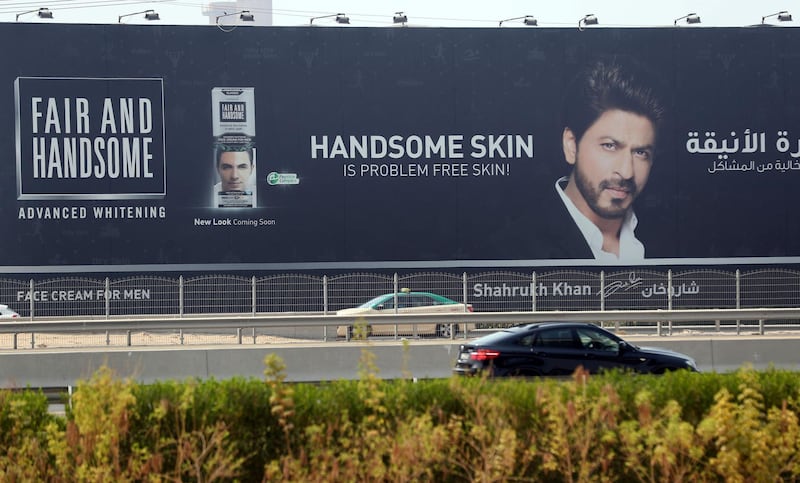The handsome face of Shah Rukh Khan on a billboard along Sheikh Zayed Road is as strong a celebrity endorsement as there is.
To the dismay of many, however, the product happens to be a skin-whitening cream – no surprise, given that Bollywood stars have long endorsed the Fair and Handsome brand.
But the latest advertisement campaign and a string of recent bad press around the practice has reignited a debate about skin-whitening creams, including about their effects on health.
Last week – in a first for the UK – two British brothers were convicted of selling an illegal skin-whitening cream containing a banned ingredient linked to irreversible skin, liver and nervous system damage.
And last year, the UAE’s Health Ministry warned customers not to be taken in by whitening products promoted by social media influencers, even if they are sold legally.
Fair and Handsome and other products, including from large companies such as Nivea, are approved and widely available in the UAE.
“We live in a region and period where aesthetics are a priority in our lives,” said Dr Tara Wyne, clinic director at the counselling service Lighthouse Arabia.
“People make no distinction between whitening their teeth and whitening their skin.”
_______________
Read more:
Some UAE dentists caught out for grossly over-treating patients
UAE’s sugar tax ‘not the only answer to curbing country’s health issues’
_______________
Experts predict the legal global market for skin whitening products will grow to $31.2 billion (Dh114.5bn) by 2024.
The markets driving the growth are the Middle East, Asia and Africa.
“Users believe the mindset that lighter and fairer is more desirable, which fits age-old social constructs about white or light skin being superior,” Dr Wyne said.
She worries about the psychological effects of whitening the skin.
“The forces driving us towards these changes can also be a lack of acceptance, unconscious messages about darker-skin inferiority and an implicit message that lighter skin equates to more happiness and success, which is clearly nebulous,” she said.
Khan, when challenged about promoting a skin-lightening product to Indians and darker-skinned customers, admitted in an 2016 interview with The Guardian: "I'm not going to wash my face with it because I don't do it, I don't like it.
“But then you can ask about so many things I endorse.
“There are 27 of them and there will be a lot of contradictions.”
The consequences of skin bleaching can be far-ranging. The Health Ministry last year banned two products, Faiza Beauty Cream and Unitone 4 White, after it was found they contained the chemical hydroquinone, which can cause serious side effects.
These include acne and discoloured blotches on the face, known as melasma. In some cases the damage is irreversible.
Eczema and hyperpigmentation are other side effects of using skin-whitening products obtained through less-than-reputable sources.
Speaking after the conviction of the British dealers last week, UK surgeon Dr Jonquille Chantrey told The National that "the most serious risk of all with uncontrolled hydroquinone use is a condition that creates an irreversible blackening of the skin".
Practitioners disagree about the effect of legal and approved applications, particularly when administered professionally. Bianca Estelle, founder and director of Bea Skin Clinic, said most the health risks came from using unsafe products containing hydroquinone, and not using approved brands.
She said there were already stringent laws in place across the globe about the sale and use of such products.
“Naturally derived ingredients such as glutathione or kojic acid support safe skin lightening,” she said.
“I’ve come across clients who used them for skin confidence because of scarring and discolouration.
“There are those who use them for the more controversial reasons, such as cultural prestige being attached to fairer skin.”
Ms Estelle said some people simply wanted to maintain the same skin tone across the entire body.
“It’s definitely not one-size-fits-all when it comes to skin lightening,” she said.
Ms Estelle’s clinic operates from London but has many clients from the UAE. She also warned about castigating those who seek out skin-whitening procedures.
“Skin lightening is a controversial issue, but it’s something that within some cultures is so deeply entrenched that it will never end,” Ms Estelle said.
“It is better to have safe options and open conversations than keeping these popular treatments and products taboo and risking more damage to people’s skin for lack of education.”
She said that those who wished to find and use skin-whitening products – safe or otherwise – would find a way.







